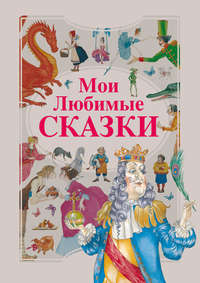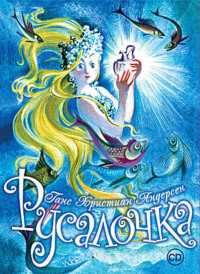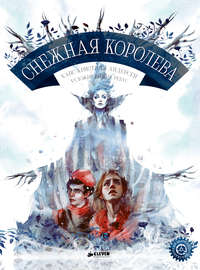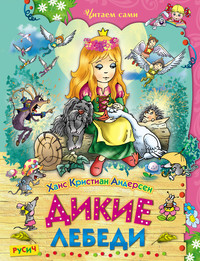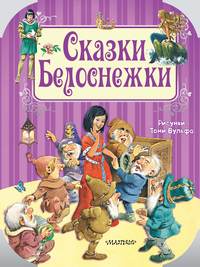 полная версия
полная версияHans Andersen's Fairy Tales. First Series
"You poor creature," said the roses, "be at rest. We will hide you; lean your little head against us."
The sparrow spread out her wings once more, then drew them in close about her and lay dead among the roses, her fresh and lovely neighbors.
"Tweet," sounded from the nest; "where can our mother be staying? It is quite unaccountable. Can this be a trick of hers to show us that we are now to take care of ourselves? She has left us the house as an inheritance, but as it cannot belong to us all when we have families, who is to have it?"
"It won't do for you all to stay with me when I increase my household with a wife and children," remarked the youngest.
"I shall have more wives and children than you," said the second.
"But I am the eldest," cried a third.
Then they all became angry, beat each other with their wings, pecked with their beaks, till one after another bounced out of the nest. There they lay in a rage, holding their heads on one side and twinkling the eye that looked upward. This was their way of looking sulky.
They could all fly a little, and by practice they soon learned to do so much better. At length they agreed upon a sign by which they might be able to recognize each other in case they should meet in the world after they had separated. This sign was to be the cry of "tweet, tweet," and a scratching on the ground three times with the left foot.
The youngster who was left behind in the nest spread himself out as broad as ever he could; he was the householder now. But his glory did not last long, for during that night red flames of fire burst through the windows of the cottage, seized the thatched roof, and blazed up frightfully. The whole house was burned, and the sparrow perished with it, while the young couple fortunately escaped with their lives.
When the sun rose again, and all nature looked refreshed as after a quiet sleep, nothing remained of the cottage but a few blackened, charred beams leaning against the chimney, that now was the only master of the place. Thick smoke still rose from the ruins, but outside on the wall the rosebush remained unhurt, blooming and fresh as ever, while each flower and each spray was mirrored in the clear water beneath.
"How beautifully the roses are blooming on the walls of that ruined cottage," said a passer-by. "A more lovely picture could scarcely be imagined. I must have it."
And the speaker took out of his pocket a little book full of white leaves of paper (for he was an artist), and with a pencil he made a sketch of the smoking ruins, the blackened rafters, and the chimney that overhung them and which seemed more and more to totter; and quite in the foreground stood the large, blooming rosebush, which added beauty to the picture; indeed, it was for the sake of the roses that the sketch had been made. Later in the day two of the sparrows who had been born there came by.
"Where is the house?" they asked. "Where is the nest? Tweet, tweet; all is burned down, and our strong brother with it. That is all he got by keeping the nest. The roses have escaped famously; they look as well as ever, with their rosy cheeks; they do not trouble themselves about their neighbors' misfortunes. I won't speak to them. And really, in my opinion, the place looks very ugly"; so they flew away.
On a fine, bright, sunny day in autumn, so bright that any one might have supposed it was still the middle of summer, a number of pigeons were hopping about in the nicely kept courtyard of the nobleman's house, in front of the great steps. Some were black, others white, and some of various colors, and their plumage glittered in the sunshine. An old mother pigeon said to her young ones, "Place yourselves in groups! place yourselves in groups! it has a much better appearance."
"What are those little gray creatures which are running about behind us?" asked an old pigeon with red and green round her eyes. "Little gray ones, little gray ones," she cried.
"They are sparrows – good little creatures enough. We have always had the character of being very good-natured, so we allow them to pick up some corn with us; they do not interrupt our conversation, and they draw back their left foot so prettily."
Sure enough, so they did, three times each, and with the left foot too, and said "tweet," by which we recognize them as the sparrows that were brought up in the nest on the house that was burned down.
"The food here is very good," said the sparrows; while the pigeons strutted round each other, puffed out their throats, and formed their own opinions on what they observed.
"Do you see the pouter pigeon?" asked one pigeon of another. "Do you see how he swallows the peas? He takes too much and always chooses the best of everything. Coo-oo, coo-oo. How the ugly, spiteful creature erects his crest." And all their eyes sparkled with malice. "Place yourselves in groups, place yourselves in groups. Little gray coats, little gray coats. Coo-oo, coo-oo."
So they went on, and it will be the same a thousand years hence.
The sparrows feasted bravely and listened attentively; they even stood in ranks like the pigeons, but it did not suit them. So having satisfied their hunger, they left the pigeons passing their own opinions upon them to each other and slipped through the garden railings. The door of a room in the house, leading into the garden, stood open, and one of them, feeling brave after his good dinner, hopped upon the threshold crying, "Tweet, I can venture so far."
"Tweet," said another, "I can venture that, and a great deal more," and into the room he hopped.
The first followed, and, seeing no one there, the third became courageous and flew right across the room, saying: "Venture everything, or do not venture at all. This is a wonderful place – a man's nest, I suppose; and look! what can this be?"
Just in front of the sparrows stood the ruins of the burned cottage; roses were blooming over it, and their reflection appeared in the water beneath, and the black, charred beams rested against the tottering chimney. How could it be? How came the cottage and the roses in a room in the nobleman's house? And then the sparrows tried to fly over the roses and the chimney, but they only struck themselves against a flat wall. It was a picture – a large, beautiful picture which the artist had painted from the little sketch he had made.
"Tweet," said the sparrows, "it is really nothing, after all; it only looks like reality. Tweet, I suppose that is the beautiful. Can you understand it? I cannot."
Then some persons entered the room and the sparrows flew away. Days and years passed. The pigeons had often "coo-oo-d" – we must not say quarreled, though perhaps they did, the naughty things! The sparrows had suffered from cold in the winter and lived gloriously in summer. They were all betrothed, or married, or whatever you like to call it. They had little ones, and each considered its own brood the wisest and the prettiest.
One flew in this direction and another in that, and when they met they recognized each other by saying "tweet" and three times drawing back the left foot. The eldest remained single; she had no nest nor young ones. Her great wish was to see a large town, so she flew to Copenhagen.
Close by the castle, and by the canal, in which swam many ships laden with apples and pottery, there was to be seen a great house. The windows were broader below than at the top, and when the sparrows peeped through they saw a room that looked to them like a tulip with beautiful colors of every shade. Within the tulip were white figures of human beings, made of marble – some few of plaster, but this is the same thing to a sparrow. Upon the roof stood a metal chariot and horses, and the goddess of victory, also of metal, was seated in the chariot driving the horses.
It was Thorwaldsen's museum. "How it shines and glitters," said the maiden sparrow. "This must be the beautiful, – tweet, – only this is larger than a peacock." She remembered what her mother had told them in her childhood, that the peacock was one of the greatest examples of the beautiful. She flew down into the courtyard, where everything also was very grand. The walls were painted to represent palm branches, and in the midst of the court stood a large, blooming rose tree, spreading its young, sweet, rose-covered branches over a grave. Thither the maiden sparrow flew, for she saw many others of her own kind.
"Tweet," said she, drawing back her foot three times. She had, during the years that had passed, often made the usual greeting to the sparrows she met, but without receiving any acknowledgment; for friends who are once separated do not meet every day. This manner of greeting was become a habit to her, and to-day two old sparrows and a young one returned the greeting.
"Tweet," they replied and drew back the left foot three times. They were two old sparrows out of the nest, and a young one belonging to the family. "Ah, good day; how do you do? To think of our meeting here! This is a very grand place, but there is not much to eat; this is the beautiful. Tweet!"
A great many people now came out of the side rooms, in which the marble statues stood, and approached the grave where rested the remains of the great master who carved them. As they stood round Thorwaldsen's grave, each face had a reflected glory, and some few gathered up the fallen rose leaves to preserve them. They had all come from afar; one from mighty England, others from Germany and France. One very handsome lady plucked a rose and concealed it in her bosom. Then the sparrows thought that the roses ruled in this place, and that the whole house had been built for them – which seemed really too much honor; but as all the people showed their love for the roses, the sparrows thought they would not remain behindhand in paying their respects.
"Tweet," they said, and swept the ground with their tails, and glanced with one eye at the roses. They had not looked at them very long, however, before they felt convinced that they were old acquaintances, and so they actually were. The artist who had sketched the rosebush and the ruins of the cottage had since then received permission to transplant the bush and had given it to the architect, for more beautiful roses had never been seen. The architect had planted it on the grave of Thorwaldsen, where it continued to bloom, the image of the beautiful, scattering its fragrant, rosy leaves to be gathered and carried away into distant lands in memory of the spot on which they fell.
"Have you obtained a situation in town?" then asked the sparrows of the roses.
The roses nodded. They recognized their little brown neighbors and were rejoiced to see them again.
"It is very delightful," said the roses, "to live here and to blossom, to meet old friends, and to see cheerful faces every day. It is as if each day were a holiday."
"Tweet," said the sparrows to each other. "Yes, these really are our old neighbors. We remember their origin near the pond. Tweet! how they have risen, to be sure. Some people seem to get on while they are asleep. Ah! there's a withered leaf. I can see it quite plainly."
And they pecked at the leaf till it fell, but the rosebush continued fresher and greener than ever. The roses bloomed in the sunshine on Thorwaldsen's grave and thus became linked with his immortal name.
THE OLD HOUSE
A VERY old house once stood in a street with several others that were quite new and clean. One could read the date of its erection, which had been carved on one of the beams and surrounded by scrolls formed of tulips and hop tendrils; by this date it could be seen that the old house was nearly three hundred years old. Entire verses too were written over the windows in old-fashioned letters, and grotesque faces, curiously carved, grinned at you from under the cornices. One story projected a long way over the other, and under the roof ran a leaden gutter with a dragon's head at the end. The rain was intended to pour out at the dragon's mouth, but it ran out of his body instead, for there was a hole in the gutter.
All the other houses in the street were new and well built, with large windowpanes and smooth walls. Any one might see they had nothing to do with the old house. Perhaps they thought: "How long will that heap of rubbish remain here, to be a disgrace to the whole street? The parapet projects so far forward that no one can see out of our windows what is going on in that direction. The stairs are as broad as the staircase of a castle and as steep as if they led to a church tower. The iron railing looks like the gate of a cemetery, and there are brass knobs upon it. It is really too ridiculous."
Opposite to the old house were more nice new houses, which had just the same opinion as their neighbors.
At the window of one of them sat a little boy with fresh, rosy cheeks and clear, sparkling eyes, who was very fond of the old house in sunshine or in moonlight. He would sit and look at the wall, from which the plaster had in some places fallen off, and fancy all sorts of scenes which had been in former times – how the street must have looked when the houses had all gable roofs, open staircases, and gutters with dragons at the spout. He could even see soldiers walking about with halberds. Certainly it was a very good house to look at for amusement.
An old man lived in it who wore knee breeches, a coat with large brass buttons, and a wig which any one could see was a real one. Every morning there came an old man to clean the rooms and to wait upon him, otherwise the old man in the knee breeches would have been quite alone in the house. Sometimes he came to one of the windows and looked out; then the little boy nodded to him, and the old man nodded back again, till they became acquainted, and were friends, although they had never spoken to each other; but that was of no consequence.
The little boy one day heard his parents say, "The old man is very well off, but he must be terribly lonely." So the next Sunday morning the little boy wrapped something in a paper, and took it to the door of the old house, and said to the attendant who waited upon the old man: "Will you please to give this from me to the gentleman who lives here? I have two tin soldiers, and this is one of them, and he shall have it, because I know he is terribly lonely."
The old attendant nodded and looked very much pleased, and then he carried the tin soldier into the house.
Afterwards he was sent over to ask the little boy if he would not like to pay a visit himself. His parents gave him permission, and so it was that he gained admission to the old house.
The brass knobs on the railings shone more brightly than ever, as if they had been polished on account of his visit; and on the doors were carved trumpeters standing in tulips, and it seemed as if they were blowing with all their might, their cheeks were so puffed out: "Tanta-ra-ra, the little boy is coming. Tanta-ra-ra, the little boy is coming."
Then the door opened. All round the hall hung old portraits of knights in armor and ladies in silk gowns; and the armor rattled, and the silk dresses rustled. Then came a staircase which went up a long way, and then came down a little way and led to a balcony which was in a very ruinous state. There were large holes and long cracks, out of which grew grass and leaves; indeed the whole balcony, the courtyard, and the walls were so overgrown with green that they looked like a garden.
In the balcony stood flowerpots on which were heads having asses' ears, but the flowers in them grew just as they pleased. In one pot, pinks were growing all over the sides, – at least the green leaves were, – shooting forth stalk and stem and saying as plainly as they could speak, "The air has fanned me, the sun has kissed me, and I am promised a little flower for next Sunday – really for next Sunday!"
Then they entered a room in which the walls were covered with leather, and the leather had golden flowers stamped upon it.
"Gilding wears out with time and bad weather,But leather endures; there's nothing like leather,"said the walls. Chairs handsomely carved, with elbows on each side and with very high backs, stood in the room; and as they creaked they seemed to say: "Sit down. Oh dear! how I am creaking; I shall certainly have the gout like the old cupboard. Gout in my back, ugh!"
And then the little boy entered the room where the old man sat.
"Thank you for the tin soldier, my little friend," said the old man, "and thank you also for coming to see me."
"Thanks, thanks" – or "Creak, creak" – said all the furniture.
There was so much furniture that the pieces stood in each other's way to get a sight of the little boy. On the wall near the center of the room hung the picture of a beautiful lady, young and gay, dressed in the fashion of the olden times, with powdered hair and a full, stiff skirt. She said neither "thanks" nor "creak," but she looked down upon the little boy with her mild eyes, and he said to the old man,
"Where did you get that picture?"
"From the shop opposite," he replied. "Many portraits hang there. No one seems to know any of them or to trouble himself about them. The persons they represent have been dead and buried long since. But I knew this lady many years ago, and she has been dead nearly half a century."
Under a glass beneath the picture hung a nosegay of withered flowers, which were, no doubt, half a century old too, at least they appeared so.
And the pendulum of the old clock went to and fro, and the hands turned round, and as time passed on everything in the room grew older, but no one seemed to notice it.
"They say at home," said the little boy, "that you are very lonely."
"Oh," replied the old man, "I have pleasant thoughts of all that is past recalled by memory, and now you too are come to visit me, and that is very pleasant."
Then he took from the bookcase a book full of pictures representing long processions of wonderful coaches such as are never seen at the present time, soldiers like the knave of clubs, and citizens with waving banners. The tailors had a flag with a pair of scissors supported by two lions, and on the shoemakers' flag there were not boots but an eagle with two heads, for the shoemakers must have everything arranged so that they can say, "This is a pair." What a picture book it was! And then the old man went into another room to fetch apples and nuts. It was very pleasant, certainly, to be in that old house.
"I cannot endure it," said the tin soldier, who stood on a shelf; "it is so lonely and dull here. I have been accustomed to live in a family, and I cannot get used to this life. I cannot bear it. The whole day is long enough, but the evening is longer. It is not here as it was in your house opposite, when your father and mother talked so cheerfully together, while you and all the dear children made such a delightful noise. Do you think he gets any kisses? Do you think he ever has friendly looks or a Christmas tree? He will have nothing now but the grave. Oh! I cannot bear it."
"You must not look on the sorrowful side so much," said the little boy. "I think everything in this house is beautiful, and all the old, pleasant thoughts come back here to pay visits."
"Ah, but I never see any, and I don't know them," said the tin soldier; "and I cannot bear it."
"You must bear it," said the little boy. Then the old man came back with a pleasant face, and brought with him beautiful preserved fruits as well as apples and nuts, and the little boy thought no more of the tin soldier.
How happy and delighted the little boy was! And after he returned home, and while days and weeks passed, a great deal of nodding took place from one house to the other, and then the little boy went to pay another visit. The carved trumpeters blew: "Tanta-ra-ra, there is the little boy. Tanta-ra-ra." The swords and armor on the old knights' pictures rattled, the silk dresses rustled, the leather repeated its rhyme, and the old chairs that had the gout in their backs cried "Creak"; it was all exactly like the first time, for in that house one day and one hour were just like another.
"I cannot bear it any longer," said the tin soldier; "I have wept tears of tin, it is so melancholy here. Let me go to the wars and lose an arm or a leg; that would be some change. I cannot bear it. Now I know what it is to have visits from one's old recollections and all they bring with them. I have had visits from mine, and you may believe me it is not altogether pleasant. I was very nearly jumping from the shelf. I saw you all in your house opposite, as if you were really present.
"It was Sunday morning, and you children stood round the table, singing the hymn that you sing every morning. You were standing quietly with your hands folded, and your father and mother were looking just as serious, when the door opened, and your little sister Maria, who is not two years old, was brought into the room. You know she always dances when she hears music and singing of any sort, so she began to dance immediately, although she ought not to have done so; but she could not get into the right time because the tune was so slow, so she stood first on one foot and then on the other and bent her head very low, but it would not suit the music. You all stood looking grave, although it was very difficult to do so, but I laughed so to myself that I fell down from the table and got a bruise, which is still there. I know it was not right to laugh. So all this, and everything else that I have seen, keeps running in my head, and these must be the old recollections that bring so many thoughts with them. Tell me whether you still sing on Sundays, and tell me about your little sister Maria, and how my old comrade is, the other tin soldier. Ah, really he must be very happy. I cannot endure this life."
"You are given away," said the little boy; "you must stay. Don't you see that?" Then the old man came in with a box containing many curious things to show him. Rouge-pots, scent-boxes, and old cards so large and so richly gilded that none are ever seen like them in these days. And there were smaller boxes to look at, and the piano was opened, and inside the lid were painted landscapes. But when the old man played, the piano sounded quite out of tune. Then he looked at the picture he had bought at the broker's, and his eyes sparkled brightly as he nodded at it and said, "Ah, she could sing that tune."
"I will go to the wars! I will go to the wars!" cried the tin soldier as loud as he could, and threw himself down on the floor. Where could he have fallen? The old man searched, and the little boy searched, but he was gone and could not be found. "I shall find him again," said the old man. But he did not find him; the tin soldier had fallen through a crack between the boards and lay there now as in an open grave.
The day went by, and the little boy returned home; the week passed, and many more weeks. It was winter, and the windows were quite frozen, so that the little boy was obliged to breathe on the panes and rub a hole to peep through at the old house. Snowdrifts were lying in all the scrolls and on the inscriptions, and the steps were covered with snow as if no one were at home. And indeed nobody was at home, for the old man was dead.
In the evening the old man was to be taken to the country to be buried there in his own grave; so they carried him away. No one followed him, for all his friends were dead, and the little boy kissed his hand to his old friend as he saw him borne away.
A few days after, there was an auction at the old house, and from his window the little boy saw the people carrying away the pictures of old knights and ladies, the flowerpots with the long ears, the old chairs, and the cupboards. Some were taken one way, some another. Her portrait, which had been bought at the picture dealer's, went back again to his shop, and there it remained, for no one seemed to know her or to care for the old picture.
In the spring they began to pull the house itself down; people called it complete rubbish. From the street could be seen the room in which the walls were covered with leather, ragged and torn, and the green in the balcony hung straggling over the beams; they pulled it down quickly, for it looked ready to fall, and at last it was cleared away altogether. "What a good riddance," said the neighbors' houses.
Afterward a fine new house was built, farther back from the road. It had lofty windows and smooth walls, but in front, on the spot where the old house really stood, a little garden was planted, and wild vines grew up over the neighboring walls. In front of the garden were large iron railings and a great gate which looked very stately. People used to stop and peep through the railings. The sparrows assembled in dozens upon the wild vines and chattered all together as loud as they could, but not about the old house. None of them could remember it, for many years had passed by; so many, indeed, that the little boy was now a man, and a really good man too, and his parents were very proud of him. He had just married and had come with his young wife to reside in the new house with the garden in front of it, and now he stood there by her side while she planted a field flower that she thought very pretty. She was planting it herself with her little hands and pressing down the earth with her fingers. "Oh, dear, what was that?" she exclaimed as something pricked her. Out of the soft earth something was sticking up.


